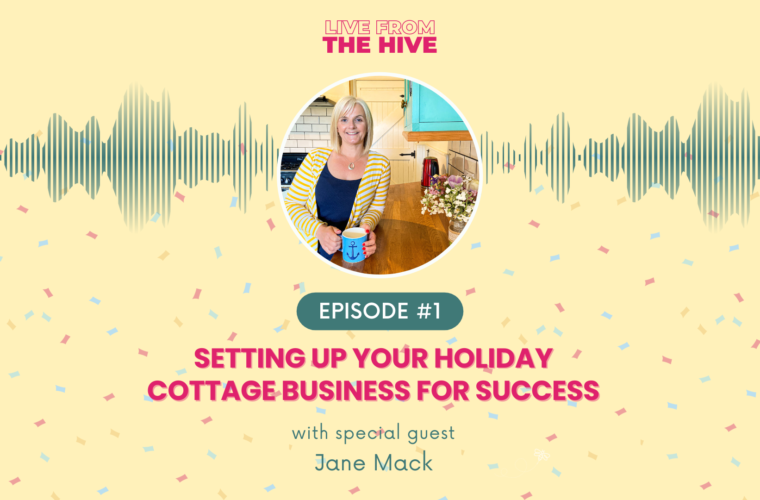I’d love to find out a little bit more about your journey in the holiday let industry.
Well, my husband and I actually started by purchasing a property management business. Initially, we were just managing holiday homes, nothing more than that.
But as time went on, the market began to shift, and we saw a gap. There wasn’t anyone handling both the lettings and advertising side of things. So, we decided to expand. We grew the business and brought all those services under one roof, offering a complete holiday let management package.
From there, the business continued to grow. We streamlined our services, added new offerings, and as the market grew, so did we.
Things were going really well. We had expanded from just the two of us to a team of seven staff, so we were in a good place. Then, we were approached by a large national company. They were interested in buying us because we had a strong market share in Stirling. It wasn’t something we had ever planned for; we were just focused on running the business and enjoying the growth. But after some time and consideration, we decided to sell.
After the sale, we continued to work with the company for a few years, managing the local office. But eventually, I decided to move into consultancy. I dabbled in a few different areas, exploring what I wanted to do next. In the end, I decided to return to the letting side of things.
I thought, “I have ten years of experience, hands-on knowledge in property management—why not use that?” So now, I focus on helping others grow their holiday let businesses and support homeowners in managing their properties.You managed a lots of different holiday lets.
What were some of the biggest challenges you faced when managing holiday lets, especially multiple lets at a time?
Managing multiple holiday lets definitely comes with its challenges. One of the biggest is resources, particularly housekeeping. You’re not just relying on your team but also on external services, and housekeeping is always the hardest part. The more properties you manage, the more housekeepers you need, and availability often depends on your location. In more central areas, you might have access to different housekeeping agencies, but we were in a rural, island location, which limited our options.
We eventually had to stagger our changeover days across the week—Friday, Sunday, Monday, etc.—because we simply didn’t have enough housekeepers for all properties to change over on a single day. It worked out well for the housekeepers, though, since it spread their workload over several days, giving them more income opportunities. It also required a mindset shift for guests, who had to get used to more flexible holiday start days.
Another big challenge was managing two sets of customers—property owners and guests—who have very different needs. Balancing those relationships can be tricky, but having a solid team helps. We focused on clearly defining our services and processes. Rather than offering a variety of services to meet everyone’s specific needs, we kept it simple and transparent. We were very clear about what services we offered, how much they cost, and what was included. This structure and clarity really helped streamline everything.
So as an agency owner, you had to manage both guests and owners. What tips can you give them to manage these two different types of customers?
First and foremost, clarity is essential. You need to clearly define the services you offer to property owners so they know exactly what to expect. Similarly, ensure guests understand your operations, terms, and services.
Flexibility is also crucial, as this is a reactive industry. If possible, get support to handle guest interactions. Having someone dedicated to guests ensures they receive the attention they need, which keeps them happy. This person can address issues, coordinate maintenance, and handle emergencies without distracting from owner relations.
It’s beneficial to have different team members focused on each area, allowing for more personalised service. Both owners and guests appreciate knowing they’re receiving dedicated attention and won’t be overlooked.
Establishing set processes for various situations is vital. Having a system in place means you’re not scrambling to figure out what to do when issues arise. Aim for consistency in how you treat customers; if a particular approach works for one owner, apply it consistently across the board. This not only enhances service but also simplifies operations.
What trends are you currently seeing in the holiday let industry?
One significant trend is the focus on guest experience. In the past, it was all about showcasing the property itself. Now, it’s about the overall experience guests have—from the moment they visit your website to the time they check out. Guests want a seamless journey, including personal contact and a sense of connection.
Sustainability is also becoming increasingly important. A recent study found that 70% of travellers consider sustainability when choosing where to stay. Property owners can take various small steps to make their accommodations more eco-friendly, which appeals to environmentally conscious travellers. Guests often appreciate opportunities to engage in local sustainability projects during their stay.
Collaborations with local businesses are another growing trend. Many agencies are starting to see the benefits of showcasing local attractions and businesses, providing mutual support and enhancing the guest experience through discounts or welcome packs.
Finally, technology and automation are evolving rapidly within the industry. While it can be overwhelming, embracing new technologies can simplify operations and improve efficiency. By automating processes, businesses can make things easier for themselves and enhance the overall guest experience.
What tips do you have for new holiday cottage owners or agency owners just getting started?
First, focus on the guest experience. Happy guests are more likely to leave great reviews and recommend you to others. If you can create a positive experience, it will naturally drive more business your way.
Next, pay attention to how your property is set up, whether it’s a single cottage or multiple properties. Maximise revenue potential by showcasing the property effectively on your website, particularly with high-quality photographs. Consider the needs of your guests by providing diverse seating options and amenities that make their stay comfortable. For example, not everyone prefers a soft sofa; some may need sturdier seating or easy access to drink surfaces like side tables.
The setup of your property plays a crucial role in guest satisfaction and can significantly impact your reviews. Additionally, while technology like AI can help streamline operations, don’t overlook the importance of a personal touch. Building trust through personal connections can enhance the guest experience and strengthen relationships with property owners.
Make an effort to engage with your guests, even if it’s just occasionally checking in during their stay. This personal interaction can foster a sense of appreciation and make guests feel valued.
Lastly, remember that every business is unique. Find ways to incorporate that personal touch, whether through in-person interactions at an office or other means. This connection is essential in the customer journey.
What are some effective marketing strategies for driving bookings in the winter?
One of the most impactful changes we made was updating our property photographs. We staged the space to highlight its seasonal appeal, showcasing cosy scenes like a lit fire with a bottle of wine for winter bookings and inviting outdoor settings for summer. This helps potential guests envision their experience year-round.
Additionally, ensure your website is optimised to retain visitors. Clearly communicate your terms, conditions, and cancellation policies to build trust. Guests need to feel secure when booking online, so a well-structured website is essential.
Utilising SEO effectively is also important. While I’m not an expert, I learned to incorporate relevant keywords to improve visibility. Consider using dynamic pricing tools to adjust rates based on demand and competition, which can help attract bookings during shoulder and winter months.
Building an email list is another crucial strategy. It allows you to communicate directly with previous guests about upcoming events and seasonal offerings. An email can keep your property at the forefront of their minds, making them aware of opportunities they might not have considered.
Ultimately, these strategies will enhance your visibility and drive bookings throughout the year, not just in peak seasons.
Maintaining a good work-life balance can be quite challenging, especially in this industry. What are your thoughts on achieving that balance, and do you have any tips for others?
Achieving a work-life balance is indeed difficult. When I started, I thought being my own boss would offer flexibility, but I soon found myself working seven days a week. I was juggling tasks like checking properties and delivering linen, often with my children in the car. It became clear that my business consumed my life.
To avoid burnout, it’s essential to seek support. You simply can’t do everything on your own. Technology can help automate many tasks, which takes some pressure off.
Setting boundaries is crucial. For example, when issues arose, I would stress about resolving them immediately, even losing sleep over them. It’s vital to recognise that perfection isn’t achievable, and trying to please everyone is unrealistic. Accept that you’ve done your best and step back when needed.
Establish specific days off and stick to them. Trust your team to handle operations, which allows you to take necessary breaks. In the past, I took only 14 days off in an entire year, which is unsustainable. However, as I learned to delegate and trust my staff, I found that taking a week off didn’t cause my business to collapse. In fact, returning after a break made me feel rejuvenated.
While it’s true that your business is always on your mind, stepping away becomes easier with practice. Setting clear boundaries will help you reclaim your life outside of work. Remember, your business can survive without you for a while, and taking that time is essential for your well-being.
Making sure you take time for yourself is crucial. What can owners automate to make their lives easier?
Absolutely! One of the tools that can really help with achieving a better work-life balance is automation. Property owners should definitely look into what they can automate.
First and foremost, everyone should have some form of a booking and payment system in place. Utilise the features that allow for automation, particularly with guest communications. For example, set up automated emails to be sent after guests check out, asking for reviews or offering follow-up messages.
There are also systems available that notify you when guests arrive at the property. For instance, key lock systems can confirm that guests have checked in, which alleviates worries about whether they’re lost or if you need to be on call for hours.
I encourage owners to explore their Property Management System (PMS) thoroughly. Often, I encounter clients who consider switching PMS systems because they feel theirs isn’t meeting their needs. I ask them what features they need and whether they’ve reached out to their support team for assistance. Many haven’t, and they often aren’t aware of the full range of features available to them.
Using your PMS effectively can significantly ease your workload. You can run monthly reports instead of manually gathering information, for instance. So, it’s essential to communicate with support teams, take the time to learn about all available features, and embrace them.
Yes, it may take some time upfront to learn how to implement these features, but the long-term benefits of freeing up your time and having peace of mind are well worth the investment. Embrace automation wherever possible.
What is one final tip you’d like to give to a fellow holiday cottage owner?
I would say, keep up to date with market changes and guest expectations. These factors are continually evolving, and as property owners, you need to adapt alongside them. It’s great to have your property set up beautifully and to see guests coming in, but remember that change is inevitable.
Rather than viewing new demands from guests as burdensome—such as needing to purchase new amenities—embrace these changes. Understand that they reflect market trends, and adapt to them. After all, it’s a business, and every business must evolve and change its approach over time.
I also recommend attending industry events whenever possible. There are numerous events happening throughout the year, both locally and in larger cities like London. These gatherings provide invaluable information and insights about the current landscape. Make an effort to attend one that’s nearby and take away useful snippets of information that you can integrate into your business. The key is not to remain stagnant; keep moving forward and stay informed about market changes.



